The International Monetary Fund (IMF) and Pakistan have reached a staff-level agreement on a $3 billion stand-by arrangement, the lender announced, a long-awaited decision by Pakistan, which is on the verge of default.

The agreement — subject to ratification by the IMF board in July — comes after an eight-month delay and offers Pakistan some relief from its acute balance of payments crisis and declining foreign exchange reserves.
The funding of $3 billion over nine months is greater than anticipated for Pakistan. The country was anticipating the release of the remaining $2.5 billion from a $6.5 billion bailout package that expired on Friday (today).
The new stand-by arrangement builds on the 2019 programme, IMF official Nathan Porter said in a statement released on Thursday, adding that Pakistan’s economy has encountered a number of challenges in recent years, including devasting floods last year and commodity price increases resulting from the conflict in Ukraine.

“As a consequence of these shocks and some policy blunders — including shortages caused by constraints on the FX market — economic growth has stalled. Even for necessities, inflation is extremely high,” he added.
“Despite the efforts of the authorities to reduce imports and the trade deficit, reserves have fallen to extremely low levels. In addition, liquidity conditions in the power sector remain severe, according to Porter’s statement.
“Given these challenges, the new arrangement would provide a policy anchor and a framework for multilateral and bilateral partners’ financial support in the future,” he said.
In the meantime, the IMF’s press release states, “The IMF staff and Pakistani authorities have reached a staff-level agreement on policies to be supported by a Stand-by Arrangement (SBA).”
In addition, the new SBA will “support the authorities’ immediate efforts to stabilize the economy in the wake of recent external shocks, maintain macroeconomic stability, and provide a framework for financing from multilateral and bilateral partners.”
IMF: “The new SBA will also create space for social and development spending through improved domestic revenue mobilization and careful execution of spending in order to meet the needs of the Pakistani people.”

In addition, the report stated that “steady policy implementation is essential for Pakistan to overcome its current challenges, including through greater fiscal discipline, a market-determined exchange rate to absorb external pressures, and further progress on reforms, particularly in the energy sector, to promote climate resilience and assist in enhancing the business climate.”
The IMF noted that the parliament had approved the budget for FY24 “consistent with the objectives of supporting fiscal sustainability and mobilizing revenues, which will allow for greater social and development spending.”
It added that the budget “advances a primary surplus of approximately 0.4% of GDP by broadening the tax base and increasing tax collection from undertaxed sectors, as well as improving progressivity, while ensuring space to strengthen support for the vulnerable through the Benazir Income Support Program.”
“It will be crucial that the budget is executed according to plan, and that the authorities resist pressures for unbudgeted spending or tax exemptions in the coming period,” the lender stressed.
It went on to say that the State Bank of Pakistan (SBP) has “withdrawn the guidance on import prioritisation and is committed to ensuring the full market determination of the exchange rate”.
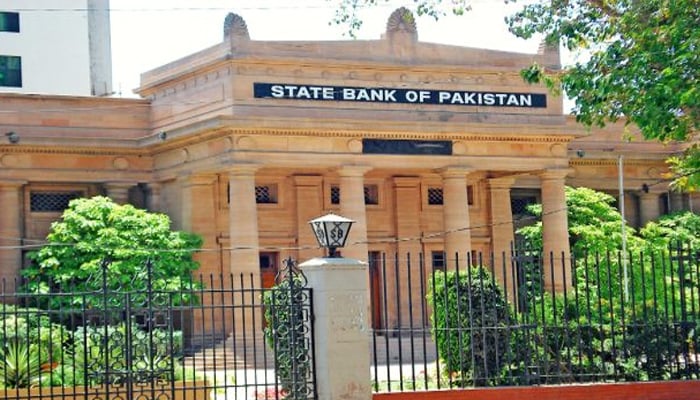
The IMF emphasized that “going forward, the SBP should remain proactive in its efforts to reduce inflation, which disproportionately affects the most vulnerable, and maintain a foreign exchange framework without restrictions on payments and transfers for current international transactions and multiple currency practices.”
In addition to the generous climate-related commitments made at the January 2023 Conference on Climate Resilient Pakistan held in Geneva, the authorities’ efforts have been concentrated on procuring new financing and the rollover of maturing debt.
It asserted, “This will support near-term policy efforts and replenish gross reserves in an effort to bring them to more comfortable levels.”
The IMF noted that the “authorities’ program also includes ongoing efforts to strengthen the viability of the energy sector (including through a timely FY24 annual rebasing), to improve SOE (state-owned enterprise) governance, and to strengthen the public investment management framework, including for projects required to build climate resilience.”
The international lender emphasized, “Full and timely implementation of the program will be crucial to its success in light of the formidable obstacles.”
Dar stated last night that a staff-level agreement for a crucial bailout deal with the IMF was “very close” and anticipated within the next twenty-four hours.
$4 billion in total had already been released. Dar had previously informed the media that the government was working on a mechanism to release the full $2.5 billion owed under the IMF program.
Prime Minister Shehbaz Sharif proclaimed the agreement’s positive effects for Pakistan on his Twitter account today, following its conclusion.
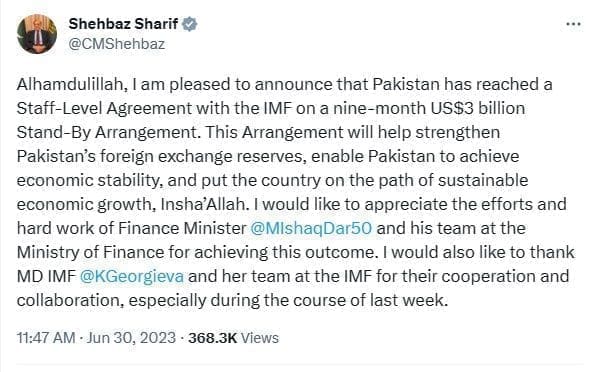
He commended Finance Minister Ishaq Dar and the finance ministry for their “efforts and hard work” in reaching the agreement.
In addition, the prime minister commended IMF Managing Director Kristalina Georgieva and her team for their “cooperation and collaboration, particularly during the past week.”
In addition to sharing the IMF’s press release, Dar thanked God.
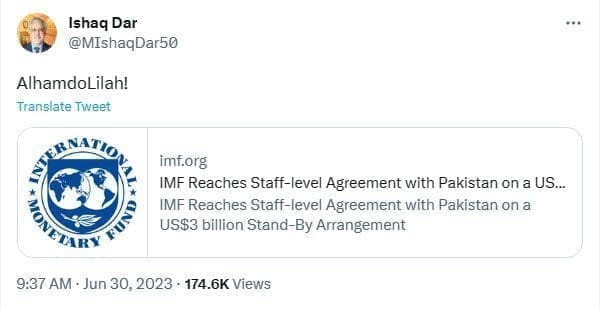
Information Minister Marriyum Aurangzeb stated that the prime minister and Dar would hold a “important press conference” regarding the IMF agreement today at 4 p.m. and “inform the nation through the media.”
Minister of Planning Ahsan Iqbal termed the development “good news.”
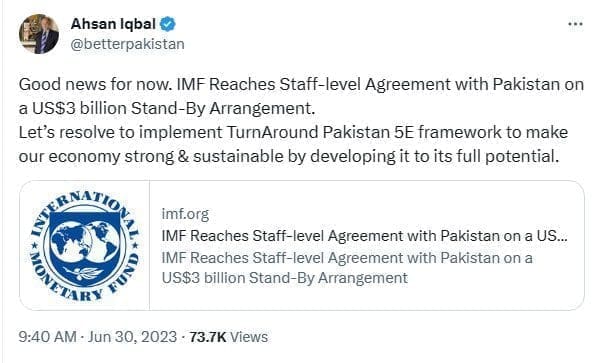
In a tweet, he stated, “Let’s commit to implementing the Turn Around Pakistan 5E framework to make our economy strong and sustainable by maximizing its potential.”
“Temporary bridge operation”
Commenting on the IMF agreement, former SBP deputy governor Murtaza Syed told Reuters, “The SBA provides Pakistan with much-needed short-term cover in the run-up to and immediately following the forthcoming elections.”
As long as Pakistan remains on track according to SBA reviews, additional financing from bilateral and other multilateral sources should result.
“In this manner, we should be able to satisfy the upcoming external debt repayment obligations. Syed referred to the SBA as a “bridging operation” and emphasized that it was not “the end of our relationship with the IMF.”
“The new government will almost certainly need to negotiate another long-term EFF (external fund facility) program with the IMF following the elections, as our balance of payments and external debt repayment issues are of a more protracted nature,” he said.
Separately, Brendan McKenna, a strategist at Wells Fargo & Co. in New York, was quoted by Bloomberg as saying, “IMF support reduces the immediate risk of default and provides necessary liquidity to support an aggressive reform agenda.”
She added, “If the government demonstrates commitment to the IMF’s program objectives, Pakistan’s debt could appreciate in the short term and have potential long-term value.”
Michael Kugelman, director of the South Asia Institute at The Wilson Center, remarked that “Islamabad waited until the very last minute to take the (politically risky) fiscal policy steps,” adding that “many of the drama and tense negotiations of recent months” could have been avoided if the steps had been taken earlier.
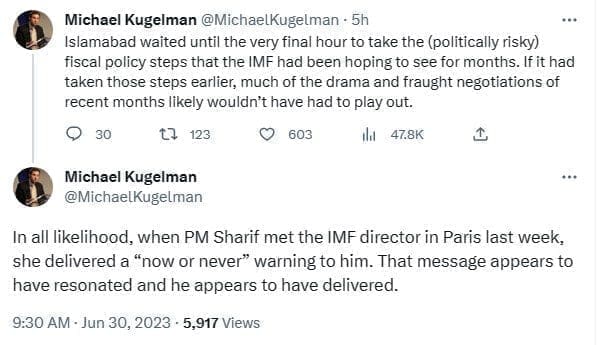
Further, he hypothesized, “When PM Sharif met the IMF director in Paris last week, she most likely gave him a ‘now or never’ warning.”
Zafar Masud, chief executive officer (CEO) of Bank of Punjab, told Reuters, “It is essential to determine how much of the $3 billion is being disbursed in advance and what conditions are attached to the remaining tranches.”
“Our objective is for the next IMF programme to be the final one, and it would be an excellent opportunity to correct our fiscal account for good.”
Shahid Habib, chief executive officer of Arif Habib Ltd, described the development as a “major positive” and stated that it will “reduce risks and uncertainties and provide investors and lenders with comfort.”
“It will also allow access to funding from other multilateral and bilateral partners, which is crucial given that Pakistan has approximately $9 billion in debt repayments and $4 billion in sovereign rollovers until December,” he added.
Abdul Aleem, chief executive officer and general secretary of the Overseas Investors Chamber of Commerce and Industries, stated, “We view it as a significant supportive action that was long-awaited to remove the country’s perpetual economic uncertainty.
While the State Bank had managed the delicate situation extraordinarily well, the draconian measures undoubtedly eroded investor confidence and the country’s reputation as a destination for new foreign direct investment.

The CEO of Topline Securities, Mohammed Sohail, remarked, “This new program exceeds our expectations.” As a new government will take office in June 2023, there were many unanswered questions about what would occur after that date.
Noting that the funding will “certainly help restore some investor confidence,” he stated, “The newly elected government will have time to assess the economic situation and decide on the next steps (larger IMF loan with or without debt restructuring/reprofiling) in November/December.”
Sakib Sherani, founder and CEO of Macro Economic Insights, told Reuters, “It is evident that the EFF has failed. The SBA provides a temporary lifeline to the current administration and the incoming administration following the elections.

The succeeding government must negotiate a new, longer-term arrangement with the Fund.
Gareth Leather, a senior Asia economist at Capital Economics in London, told Reuters, “The agreement between Pakistan and the IMF on a loan agreement should put the economy back on a more stable footing and mitigate the greatest downside risks.”
“However, historical evidence suggests that the government will struggle to uphold the strict spending commitments it has made.” There is a substantial possibility that Pakistan will rescind on the agreement once the current crisis has passed.”
He referred to the upcoming general elections as “one obvious trigger” and cautioned that even if Shehbaz is “committed to a deal, he could be replaced by the end of the year by someone less committed to the agreement.”

